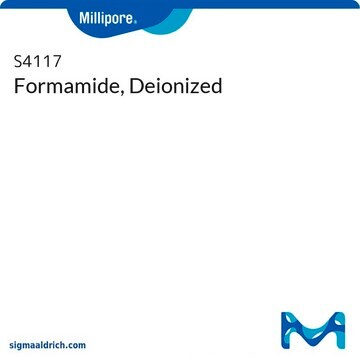93572
Formamide
puriss. p.a., ACS reagent, ≥99.5% (GC/T)
Synonym(s):
Amide C1, Formic amide
About This Item
30 mmHg ( 129 °C)
Recommended Products
grade
ACS reagent
puriss. p.a.
Quality Level
vapor density
1.55 (vs air)
vapor pressure
0.08 mmHg ( 20 °C)
30 mmHg ( 129 °C)
Assay
≥99.5% (GC/T)
form
liquid
autoignition temp.
932 °F
expl. lim.
2.7-19 % (lit.)
technique(s)
hybridization: suitable
impurities
≤0.02% free acid (as HCOOH)
≤0.1% water
refractive index
n20/D 1.447 (lit.)
n20/D 1.447
pH
4-10 (20 °C, 200 g/L)
bp
210 °C (lit.)
mp
2-3 °C (lit.)
transition temp
solidification point 2-3 °C
density
1.134 g/mL at 25 °C (lit.)
cation traces
Ca: ≤5 mg/kg
Cd: ≤1 mg/kg
Co: ≤1 mg/kg
Cr: ≤1 mg/kg
Cu: ≤1 mg/kg
Fe: ≤1 mg/kg
K: ≤20 mg/kg
Mg: ≤1 mg/kg
Mn: ≤1 mg/kg
Na: ≤20 mg/kg
Ni: ≤1 mg/kg
Pb: ≤1 mg/kg
Zn: ≤1 mg/kg
suitability
complies for miscibility
SMILES string
NC=O
InChI
1S/CH3NO/c2-1-3/h1H,(H2,2,3)
InChI key
ZHNUHDYFZUAESO-UHFFFAOYSA-N
Looking for similar products? Visit Product Comparison Guide
Application
Signal Word
Danger
Hazard Statements
Precautionary Statements
Hazard Classifications
Carc. 2 - Repr. 1B - STOT RE 2 Oral
Target Organs
Blood
Storage Class Code
6.1C - Combustible acute toxic Cat.3 / toxic compounds or compounds which causing chronic effects
WGK
WGK 1
Flash Point(F)
305.6 °F
Flash Point(C)
152 °C
Personal Protective Equipment
Regulatory Listings
Regulatory Listings are mainly provided for chemical products. Only limited information can be provided here for non-chemical products. No entry means none of the components are listed. It is the user’s obligation to ensure the safe and legal use of the product.
PRTR
Class II Designated Chemical Substances
FSL
Group 4: Flammable liquids
Type 3 petroleums
Hazardous rank III
Water soluble liquid
ISHL Indicated Name
Substances Subject to be Indicated Names
ISHL Notified Names
Substances Subject to be Notified Names
JAN Code
93572-VAR-F:
93572-25ML-F:
93572-4X25ML-F:
93572-BULK-F:
Choose from one of the most recent versions:
Certificates of Analysis (COA)
Sorry, we don't have COAs for this product available online at this time.
If you need assistance, please contact Customer Support.
Already Own This Product?
Find documentation for the products that you have recently purchased in the Document Library.
Our team of scientists has experience in all areas of research including Life Science, Material Science, Chemical Synthesis, Chromatography, Analytical and many others.
Contact Technical Service



